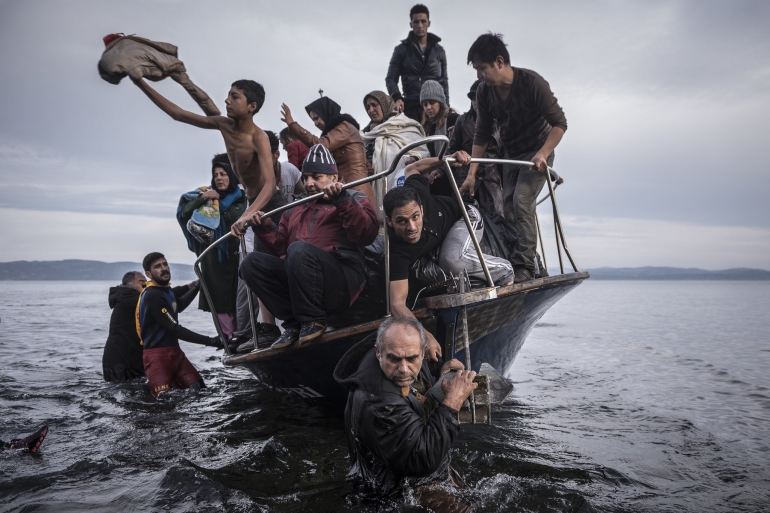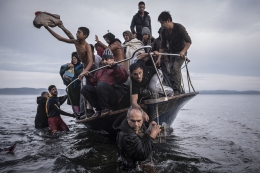People come and go. This is especially true for The European Union for the past six months. They have been failing to stop newcomers from coming in and allies from leaving. The continent, however, is still divided on the amount of hospitality they should give towards the torrential stream of new guests. [1] They need to act fast, seeing that the number of new refugees is overwhelming and consistently increasing, mostly coming from Syria, Afghanistan, and Iraq. In 2015, around 1,800,000 people have arrived in European border countries, such as Greece and Italy, and additional of 135,711 have arrived at the start of this year.[2] All of them are craving a better life and have their eyes set on the peaceful, prosperous countries of Germany, Hungary and Sweden.[3] Unfortunately, in 2015, only 292,540 of them are granted the refuge they seek and most of it was given by Germany for Syrians and Eritreans.[4]
So far, various attempts to curb the flow of people and manage the ones at hand have fallen short. Peace talks have not shown promising resolutions and people flock border and target countries disorderly in desperation.[5] Regardless, the Europeans are still plagued with worry over their arrival. Apart from pure racism, these people are simply afraid that refugees will snatch their jobs, exhaust public budget from their tax, or disrupt relatively homogenous society and its dynamics. This fear seems to even plague the reputably “nice” Scandinavians like Denmark.[6] The effect of this fear on a larger scale is apparent through the opposition towards the new refugee resettlement policy approved by European ministers last year. The new regulation to redistribute refugees across the continent, where each country was assigned a minimum quota, was opposed Romania, Czech Republic, Slovakia, and Hungary.[7]
Unwarranted Fear and Unclaimed Benefits
According to the 1951 Geneva Convention and other international protocols, asylum is a part of human right that should be granted to all refugees, regardless of their background and identity, by capable countries.[8] However, the enshrinement of it should not impede the pursuit development and welfare. Theoretically, it doesn’t. Observed within immediate time intervals, the increase of labor supply will lower wages and thus making companies more profitable. Although, indeed, with lower wage rate, natives would be less inclined to work the same jobs and employers would prefer affordable refugee worker for similar skills. Overtime, the economy would have adjusted itself and wage rate will increase back to normal because the demand for labor increased as well. With the wage rate back at initial level, more natives would be employed, even to the amount it was.[9] These things happen if refugee workers and natives are perfect substitutes.
There have been little studies about the nature of refugees in the labor market. However, their existence as a threat towards unskilled and native menial labors is not massive. There is only a 2% increase in the share of migrants working in menial jobs.[10] Furthermore, the varying skills and level of education amongst refugee is so varied that, even though it is still not properly documented until now, the effect of new arrival is usually small and it is often accompanied by new investments occurring in response to more workers.[11] The threat that these refugees would become a public liability is also unlikely seeing that 21% Syrians coming to Germany actually have post-secondary education, close enough to German average of 23%.[12]
If only they were given a chance
It is interesting that all the concerns regarding large influx of refugee would happen only when they are shut out and not allowed to integrate well within the community. As the graph has shown that while negative impacts of refugees coming in may exist for a little while, in the long run, they increase output level and be less dependent on public budget.
It is very important to also note that the sooner they are settled and integrated to labor market, the sooner they are liable for tax and be more productive in general. In regards towards the possibility of them replacing natives, most European countries are suffering from ageing and declining population where most actually enjoy good quality education. In this case, natives and refugees can serve as complements in labor market.
To let them in
Seeing that the benefits of having refugees critically hinge on their integration in host countries society, it is what needs to be taken care of first and foremost. EU’s resettlement policy last year is heading in the right direction. However, it is not enough. These refugees should be allocated to countries in need of more labors and not just any labor. It needs to be suited to the skills and industry that the country requires. This way, these migrants have a shot of utilizing their educational and professional background to be more productive and less dependent on aids and welfare facilities. Furthermore, to ensure that these sets of skills can be utilized, assimilation programs should be provided to further ease integration. Not only to eliminate language barrier between natives and refugees, introducing to customs and local values can reduce friction and hostilities towards refugees. This program should not only be given to refugees but locals as well. This is important to extinguish incomplete information about Islam or the Middle Eastern people in general that often fuels islamophobia.
The next concern to be addressed is the frighteningly large number of refugees that only keeps growing overtime. It is indeed unfortunate that there has been no study to pinpoint a saturation point where accommodation of refugees is no longer possible.[13] In the meantime, we need to start tackling the source of the problem. Detangling the mess of conflicting interests and hostilities in Syria and other conflict hotspots may take forever. Yet, we can do something about potential refugees and those who are already in Europe. More aids should be given to those in conflict areas and proper facilities as well as safe haven should be provided as a closer alternative for potential refugee. Those already in Europe should be documented properly and the decision to grant asylum should be done faster than the current rate.






